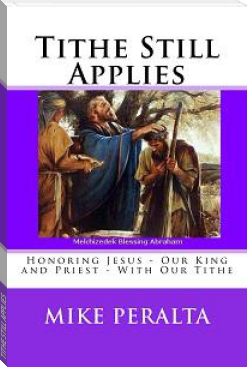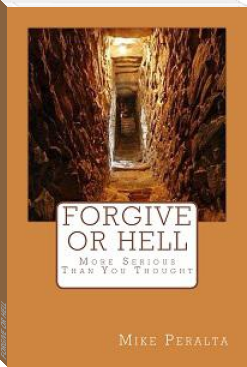TITHE STILL APPLIES by Mike Peralta (ebook reader for pc .TXT) 📕

- Author: Mike Peralta
Book online «TITHE STILL APPLIES by Mike Peralta (ebook reader for pc .TXT) 📕». Author Mike Peralta
CHAPTER 1: TITHE STILL APPLIES
CHAPTER 2: THE CEREMONIAL LAWS
CHAPTER 3: THE MORAL LAWS: THESE COMMANDMENTS STILL APPLY
CHAPTER 4: THE LAW AND THE PROPHETS ARE NOT ABOLISHED
CHAPTER 5: WHAT WAS NAILED TO THE CROSS?
CHAPTER 6: MALACHI CHAPTER 3 (NIV)
CHAPTER 7: NO WHERE IN THE BIBLE IS THE TITHE ABOLISHED
CHAPTER 8: CHRIST, MELCHIZEDEK, ABRAHAM, AND THE TITHE
CHAPTER 9: DO THOSE WHO ROB GOD OF HIS TITHE GO TO HELL ?
CHAPTER 10: JESUS - HIGH PRIEST IN THE ORDER OF MELCHIZEDEK
CHAPTER 1: TITHE STILL APPLIES
Before launching into my teaching I wish to share the following:
“Not many of you should become teachers, my fellow believers, because you know that we who teach will be judged more strictly.” (James 3:1)
This scripture puts dread and fear in me. Why? Because I am going to be held accountable in what I teach you to a much greater measure. Since the tithe deals with whether we are obedient to and robbing God I teach the following with great seriousness. Since 1 Corinthians 6:9-10 says that thieves (robbers) do not inherit the kingdom of God, please take the following teaching very serious for your own sake.
The aim of this teaching is to carefully study what God wants us to obey in regards to tithing.
Ceremonial Laws
As well as the Tithe commandment, we will also look at ceremonial (or symbolic) laws (listed below) and how we are now expected to practice them in the New Covenant:
1. Blood Sacrifices,
2. Circumcision,
3. Food and Drink laws – unclean food regulations etc.
4. The Special sabbath (festival) days mentioned in the Old Testament (Notice that this is different from the regular day of rest Sabbath Day mentioned as the fourth of the ten commandments),
We will take great care to learn this – not from what men might reason – but by what the New Testament actually tells us.
Before going on (and so as not to worry you) the above 4 laws regarding Blood Sacifices, Circumcision, Special sabbath days, and Food and Drink laws are now to be practiced symbolically and spiritually and not physically as they were practiced in the Old Testament. This will be shown through New Testament teaching.
It is important to always keep in mind that Jesus told us that: “I did not come to abolish the law or the prophets.” (Matthew 5:17) And this includes the above mentioned ceremonial laws such as circumcision, food laws, etc.
In the Old Testament, the believers were supposed to obey these ceremonial laws physically, but now we are supposed to obey these laws in the spiritual sense – in the specific way that the New Testament commands. And they also make up what Christ did for us on the cross. For example, the blood sacrifices in the Old Testament were symbolic of the ultimate sacrifice that Christ did for us by the shedding of His blood to establish the New Covenant. Notice that in this way, Jesus did not “abolish the law” - even the blood sacrifice - but fulfilled it for us perfectly, once and for all – as the New Testament tells us. Now this does not mean that the blood sacrifice was “done away with” or abolished. The blood sacrifice of animals was stopped physically and it was replaced by the blood sacrifice of Jesus. It is now practiced through Jesus – the perfect Lamb of God, by receiving Jesus as Lord and Savior.
Blood Sacrifices
It is very important to realize that “without the shedding of blood there is no forgiveness of sins.” (Hebrews 9:22) So to be saved the unbeliever must now receive the blood sacrifice that Jesus did in order for him to get saved (by receiving Jesus as his Lord and Savior). So we see in just this one law the eternal consequences of disregarding these ceremonial laws – that many take as trivial and recklessly throw away as if they were trash.
This is why I stated earlier, that we must learn about all these laws very carefully and learn how to practice them in the way that God desires. As you can see from the blood example, these ceremonial laws have a great meaning and great effect, and as I will show later – represent what is given to us in our salvation by grace through faith. In fact all four of the ceremonial laws previously mentioned have a connection and give meaning to the grace we now receive and have in Christ.
The sacrificial system with its holy feast days, new moon festivals and yearly sabbath days, such as Passover, described in Colossians 2:14-16 pointed forward to the work of Jesus on the cross. They looked forward in faith to the atoning death of Jesus. As Colossians 2:17 itself says “These [ceremonial laws mentioned in Colossians 2:16] are a shadow of the things that were to come; the reality, however, is found in Christ.”
Section 3: Moral Laws a.k.a. Non-Ceremonial Laws
In addition to covering the ceremonial laws I will also cover what is classified as the non-ceremonial laws -- such as the Ten Commandments -- “Do Not Steal”, “Do Not Murder”, etc. and laws such as the Tithe. These are usually called “Moral Laws” or “Ethical Laws.” They can have symbolic meaning in addition to having practical physical application – but they are the type of laws that God commands that we still physically obey.
I realize everyone understands and accepts that we are still to obey the moral laws such as “Do Not Steal”, and “Do Not Murder”, etc. Those sins are way too obvious for satan to deceive people into thinking “they have been done away with.” Where people are mistaken is in thinking that some of the other non-ceremonial laws such as the Sabbath (4th of the Ten Commandments) and the Tithe commandment of Malachi 3:8 “have been done away with.” I will show through New Testament scripture and example that these commandments have not “been done away with.”
The Tithe Law (Malachi Chapter 3)
We will cover some details of The Tithe Commandment as given to us from Malachi Chapter 3, Matthew Chapter 23, Luke Chapter 11, and Hebrews Chapter 7. As well as learning about the tithe we will also learn about the attitude God wants us to have about obeying His commandment of the Tithe – and in fact all His commandments. We are supposed to not only be obedient but also [cheerfully] be willing to obey as Isaiah 1:19-20 tells us: “If ye be willing and obedient, ye shall eat the good of the land: 20 but if you resist and rebel, you will be devoured by the sword.”
CHAPTER 2: THE CEREMONIAL LAWS
We will start with Colossians 2:16, “Let no man therefore judge you in meat, or in drink, or in respect of an holyday, or of the new moon, or of the sabbath days:” King James Bible (KJV)
“Let no one, then, judge you in eating or in drinking, or in respect of a feast, or of a new moon, or of sabbaths,” Young's Literal Translation (YLT)
Food and Drink Laws
In the Old Testament God gave Israel regulations about clean and unclean animals that they could not and should not touch and eat. In the New Testament times these laws have now turned into commandments regarding evil thoughts of the heart – from which evil originates. As Jesus says in Matthew 15:17-20 Jesus clarifies that what makes a man unclean (are not food and drink) but things from the heart such as “evil thoughts, murder, adultery, sexual immorality, theft, false testimony, slander.” These are the things that we must reject and not take in (eat or entertain).
So this command is not abolished but it’s practice is now clarified to be applied to avoiding unclean thoughts and actions that come from the heart.
Holyday Feasts, New Moons, [Special] Sabbath Days
Or of the sabbath days - Greek, "of the Sabbaths." The word Sabbath in the Old Testament was applied not only to the seventh day or rest, but also to all the days of holy rest that were observed by the Hebrews in their various festivals. Without a doubt that is what is being referred to in this passage of scripture. This is because the word is used in the plural number, and the apostle does not specifically refer to “The Sabbath Day” (the fourth of the ten commandments). If he had used the singular word "The Sabbath," it would then, of course, have been clear that he meant to teach that that fourth commandment had ceased to be obligatory – that “The Sabbath” was no longer to be kept. But the use of the plural term shows that he had in mind the several number of days which were kept by the Hebrews as festivals, as a part of their ceremonial laws.
In Leviticus 23:1-8 God distinguishes between “The Sabbath Day,” (now observed as the Lord’s Day on Sunday) the fourth of the Ten Commandments, and the special sabbath days and festivals.
In Lev 23:3 God explains about “The Sabbath Day.” He repeats His commandment to “Keep Holy The Sabbath Day.” It is important to recognize that the need for The Sabbath Day still applies because it’s purpose is to bless man with a day of rest to honor and focus and listen to and worship God. As is well known in history, the Sabbath Day (now the Lord’s day) serves a very vital purpose and “is made for man.” Jesus Himself said “The Sabbath was made for man.” Since man still has to work for a living, then the need for The Sabbath Day of rest is still very much needed for modern man.
And then next God also explains about the appointed feasts – for example in Lev 23:4 the Passover (beginning at twilight on the fourteenth day of the first month). It is now obvious that the Passover festival has been fulfilled in Christ and so that is why we do not physically observe this ceremonial law. It’s not that it is abolished. It is just that Jesus fulfilled it for us – once and for all – on the cross of Calvary. But we still need to observe the Passover (passed over from death) by receiving Christ as our Lord and Savior. Otherwise we would be condemned to spiritual death – which is Hell. Hence





Comments (0)